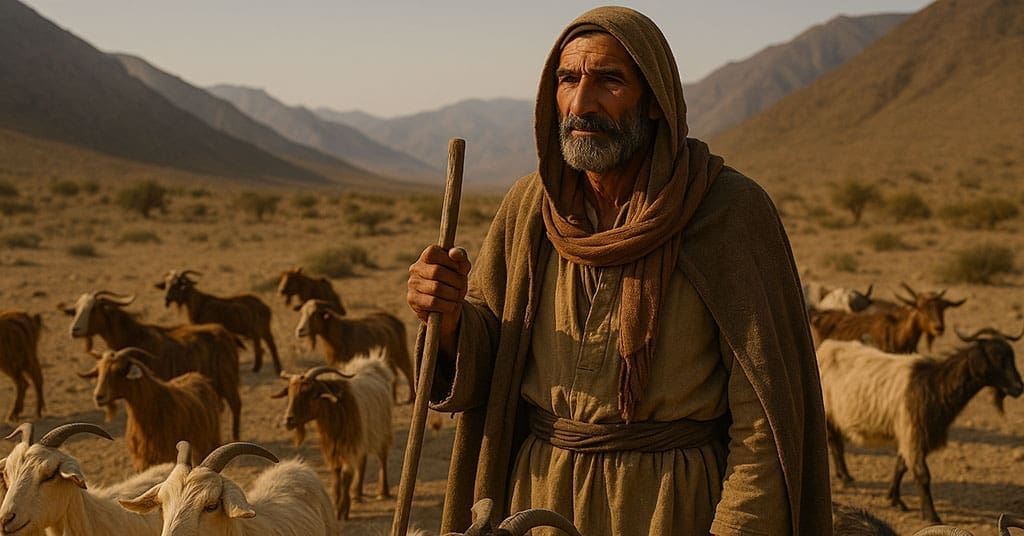Turns out you don’t need big government to get things done. Nomads offer real lessons in how communities can thrive on their own
As a cultural anthropologist, I had the privilege of living in societies very different from my urban American upbringing—societies that operated without centralized government, relying instead on kinship, community leadership and collective responsibility. These experiences challenged many assumptions I had grown up with about law, power and how people organize their lives.
While I might have encountered cultural differences in rural parts of North America—villages, isolated farms and ranches—I was drawn, like many anthropologists, to more distant and unfamiliar societies.
Growing up in a predominantly Jewish neighbourhood and school, I belonged to a minority that was highly assimilated. More traditional Jewish communities diverged further from mainstream culture. Had I studied America’s religious diversity more deeply, I would have discovered similarly distinct ways of life. But I looked outward.
Before going abroad, I conducted a small study in the Chicago Magistrate’s Court. I saw repeated cases of domestic violence: a spouse, often drunk, was arrested after an altercation, brought to court the next day, only for the other spouse to refuse to press charges. The judge would release the offender with a warning.
This intrigued me. The law wasn’t being enforced by the book. Instead, the process itself—the arrest, the court appearance—functioned as a kind of social regulation. Police acted like referees, helping maintain order in recurring domestic disputes. I realized then that legal systems can operate informally while still being effective.
That contrasted with my middle-class neighbourhood, where police were rarely seen and family issues were handled privately, often through therapists. The justice system, in that setting, was practically invisible.
During my graduate studies at the University of Chicago, I became fascinated by nomadic peoples—those who move regularly to make a living. Migration is rarely random. It’s a rational response to environmental and economic pressures.
Foragers move strategically, following seasonal plant growth and animal migrations. The Inuit of Canada’s North, the Pygmies of Central Africa’s Ituri Forest, and the San of the Kalahari are examples. Pastoralists—such as the Bedouin, Mongols and Maasai—raise livestock on natural pastures that vary by season and geography. Some groups, like trading nomads in India, migrate with pack animals to exchange goods and resources across regions.
My own fieldwork was with the Yarahmadzai Baluch of southeastern Iran’s Sarhad Desert. Over three periods between 1968 and 1976, I lived among them for a total of 27 months. They moved about 10 times a year, living in black goat-hair tents and adapting their migrations to benefit their livestock, access clean water, avoid disease and maintain household hygiene. Their longest journey each year was to their date palms in a lowland basin across the mountains.
The Baluch relied on diverse survival strategies. While primarily pastoralists raising sheep, goats and camels, they also harvested dates, gathered wild plants, hunted, built mud dams and planted opportunistic crops. As with many subsistence societies, they didn’t rely on one method—they used all available resources.
Historically, before the Persian government asserted control in the 1930s, the Baluch were known for raids into neighbouring provinces to seize goods and people. One matriarch in the group I lived with had been abducted from a distant village and later married by her captor. Though slavery was abolished, former slave communities remained marginalized. Slavery, as history reminds us, was not confined to the West but existed across many societies.
The Baluch were organized into tribes, political units based on patrilineal descent. These tribes offered security through collective identity. In conflict, the rule was simple: closer kin support each other. Minor disputes involved immediate kin; larger ones rallied whole tribal blocks. This system, known as complementary opposition, provided both internal cohesion and external defence.
Group protection extended beyond people to livestock, water sources, pasturelands and tribal territory. Rights were secured not by law, but by a group’s ability to defend them—an insight with broad relevance.
Their governance was decentralized and based on consensus. Herding groups formed temporary contracts each year, managing shared flocks collectively. The land was owned by the tribe as a whole, and outsiders needed permission from the chief, whose authority depended entirely on communal support.
What struck me most was how directly responsible the Baluch were for their lives. They produced their food, defended their territory and decided together how to live. It was an egalitarian society with no reliance on distant authority. That’s why such societies often resist integration into state systems—they already function effectively on their own terms.
I also studied two other pastoral societies: the Reika of Rajasthan, India, and the highland shepherds of Sardinia, Italy. Both were part of state societies and engaged with markets, selling what they produced and buying what they lacked.
Their mobility differed. Sardinian shepherds practised transhumance—seasonal migration between permanent villages and mountain pastures. Reika families migrated longer distances, sometimes for a year or more, depending on rainfall in the desert.
Though formally under government control, neither group fully surrendered their autonomy. Sardinian shepherds sometimes engaged in livestock theft and arson, leading to personal vendettas. These were individual actions—the state suppressed large kin-based defence groups. In extreme cases, governments have aimed to weaken family structures, leaving individuals dependent on the state.
The Reika moved in large numbers, using their presence to discourage interference along their route. Like the Baluch, they retained elements of collective strength despite living within state borders.
Anthropologists study these societies to understand, not to judge. We’re not moral philosophers or theologians. Evaluating other cultures by our own values—ethnocentrism—or judging the past by modern standards—presentism—only limits understanding.
Neither approach helps us grasp the full diversity of human experience.
Philip Carl Salzman is an emeritus professor of anthropology at McGill University, a senior fellow at the Frontier Centre for Public Policy, a writing fellow at the Middle East Forum, and a past president of Scholars for Peace in the Middle East.
Explore more on Anthropology, Culture, Tribalism
The views, opinions, and positions expressed by our columnists and contributors are solely their own and do not necessarily reflect those of our publication.
Troy Media empowers Canadian community news outlets by providing independent, insightful analysis and commentary. Our mission is to support local media in helping Canadians stay informed and engaged by delivering reliable content that strengthens community connections and deepens understanding across the country.




